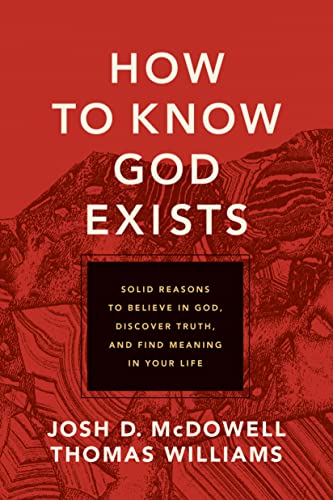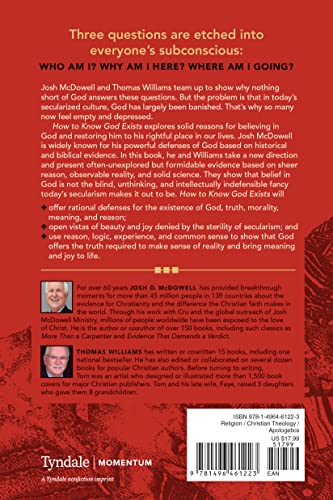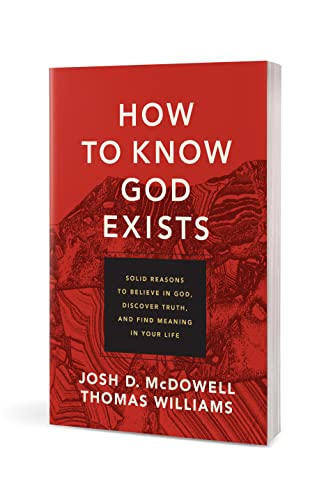



How to Know God Exists: Solid Reasons to Believe in God, Discover Truth, and Find Meaning in Your Life
A**S
It is rational to believe in God
I really enjoyed reading “How to Know God Exists” by Josh McDowell and Thomas Williams because it provides a well-reasoned and well-written discussion as to why it is rational to believe in a creator God rather than in blind naturalistic processes to account for the complexity and beauty of the universe we see around us. I read it and passed it along to my niece who is a biological science major in college. Then I bought another copy so I can pass it along to any others who may need their faith built up. There are a lot of voices echoing the naturalistic viewpoint but here is a book that challenges that perspective.The 288 page book does not quote scripture as the basis for proving its arguments as the Bible would not likely be accepted as authoritative by a person who holds to a Godless naturalistic vantage point. Rather, the authors argue their points based on logic, historical facts, and scientific principles.Here is a summarizing sample of the book from page 188:“Naturalism gives us a universe filled with contradictions and illusions. It gives us creatures that seem to have been designed but were not, laws that are known to be inviolable but were violated, morality that seems to have authority but does not, reason that seems to be rational despite its non-rational origins, realities that seem to be true but are false, and beauty that seems to have meaning but does not. To naturalists, all these “seemings” are illusory. They cannot be sure that any are real. Despite the appearance of order and meaning that emanates from all that exists, naturalists must force themselves to believe that beneath the surface, all existence is senseless, mechanistic, meaningless, and purposeless. They have no rational alternative, for to remain naturalists, they must deny the presence of any living, supernatural, purposeful first cause that could give meaning and purpose to existence.”I invite you to dive into this book to explore the reasons for believing in the “theistic alternative”.
G**S
A refreshing look at Christian evidences
How To Know God Exists is a refreshing look at Christian evidences. Josh and Tom discuss truth, beauty, and history. They answer the question: “when did we in the U.S. go from a culture that embraced freedom OF religion to one that demanded freedom FROM religion?”This is a book about God that does not use the Bible as a “proof text”. It uses logic, science, reason, and what can be observed in nature to support its claims. It asserts that “Christianity is nothing like the distorted parody that secularism presents”. In a world where science and religion often seem to clash and where progressives and conservatives argue over what is “right”, this book is a refreshing respite.
U**N
Compelling Answers To Life
Josh is a respected apologist who gives the reader compelling reasons that there is a being who is timeless & spaceless, yet demonstrates His love for His highest creation, humans. He shows evidence that the Christian worldview is coherent & corresponds to reality when answering these questions: How did I get here (origin) ? Why am I here (purpose) ? What is right and wrong (morality) ? What happens to me after I'm not here (destiny) ?
M**F
If you need a book to believe....
Wouldn't it just be easier for God to reveal himself to currently living people?
R**M
An enlightening book
In a time when unproved and unprovable theories are constantly touted as absolute facts, it is refreshing to read the dismantling of many of those theories. The fact that many consider them as "sacred" truths makes this same debunking repugnant to some. My husband and I read HOW TO KNOW GOD EXISTS aloud together and thoroughly enjoyed it.We were impressed with the extra-biblical research, the scholarly reasoning, and the devotion to honest thinking the writers showed. Tears came as we read the chapter on reveling in beauty and joy, having experienced that joy. Thank you, Josh McDowell and Thomas Williams, for this uncommonly great book.Reba G. Branum
A**R
Poorly argued - regardless of where you are with faith you can do better than this book
Summary review:The authors have good intent, but this is a terribly badly argued book. It's unlikely to help the Christian wanting to dig deeper into apologetics, and I'd be extremely worried about a curious agnostic reading this book for fear they might think being a Christian requires the sort of flawed reasoning displayed here (hint: it doesn't, but you'll not find proof of that in this book!)Full review:There are a few interesting and thought-provoking ideas which I'll take away. However, most of the book is quite poorly argued. The authors attempt to expound on some of the classic arguments for the existence of God, but unfortunately their presentation of the train of logic is not fully coherent. The authors have a nasty habit of asserting 'fact' statements, essential to their line of reasoning, but without basis or evidence. Many of these 'facts' are not self-evidently (or indeed at all) true, but this is plastered over. I found myself screaming at the book (in my head) several times - 'yes, but ...', or 'why haven't you mentioned this...' or 'that's simply not true!', or 'why on earth are you going down this rabbit hole', etc...At several points in the book I felt like the authors were attacking straw-men versions of what modern atheists believe. Certainly, the views they were arguing against didn't align well with what I believed when I was atheist, or how my atheist friends see the world. Worse still, the chapters on the origin of the universe and the origin of life are thinly veiled attempts to promote some form of literal interpretation of Genesis 1-11 (impressive given that no scripture is quoted in the book). Genesis is not a science textbook - never was, never was meant to be. The author(s) of Genesis took the current 'scientific' understanding at the time (which was several thousand years ago now and thus extremely limited and flawed), borrowed bits of the creation stories from surrounding cultures, and with these wove a beautiful, poetic metaphor/tale full of deep theological truths. The science is out of date - but it was never the point! The theological truths are timeless, and they are the intended message of Genesis.Sadly, the authors attempts to poke holes in the current understanding of the cosmology, evolution and origin of life seem desperate, and a tad embarrassing (in addition to being unconvincing). There are many Bible-affirming Christians who also accept the findings of science (indeed many add to science's findings in their jobs as researchers, doctors, etc). This isn't hard to understand - science tells us *how* (big bang, evolution, genetics, nuclear physics, etc) and the Bible tells us *why* (the universe including humans were willed into existence by an unimaginably powerful, transcendent and loving God). The two are distinct in scope, and both are important. Trying to prove literal veracity of Genesis by attacking current science relegates God to a god-of-the-gaps - this is both dangerous (the gaps get smaller every year) and beneath Him.I'm a Christian. I'm intellectually convinced that the resurrection of Jesus is a historical fact, and emotionally convinced the God lives and works today. I have no bone to pick with religion, just poor logic. There are coherent arguments for religion along similar lines to those in this book (finely-tuned universe, existence of absolute morality, etc), but this book's stab at explaining them falls flat.I really wish the authors had asked a (perhaps more cynical and clinically-logical) friend to review the book prior to publication - I think much of it could be salvageable and the book could have been a useful addition to the modern apologetics catalogue with some of the flaws in reasoning ironed out or explained better. As it stands, I think this book has nothing to offer; if you already believe then this book adds nothing. If you are not a believer then this book will certainly not convince you. Worse, it may leave you thinking that belief in Christianity requires the sort of faulty reasoning displayed in this book. It doesn't, but you'll need to look elsewhere to find a better presented line of reasoning (try 'Why Believe?: A Reasoned Approach to Christianity' by Shenvi).In summary, a wasted opportunity of a book, and a great shame. Avoid, and find a better alternative if you are seeking answers or want to understand the firm, rational foundation for theism and Christianity.
Trustpilot
2 weeks ago
4 days ago